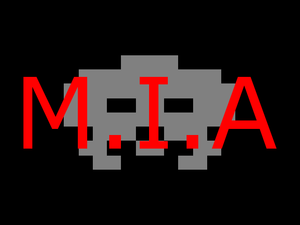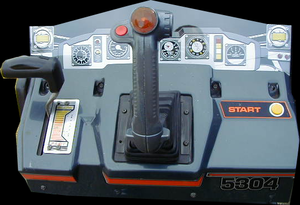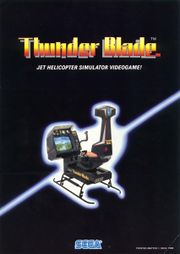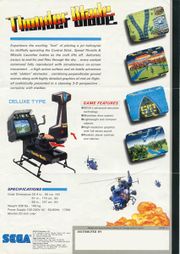Lost In Translation/Thunder Blade
| Thunder Blade | |
|---|---|
| Manufacturer | Sega |
| Released | 1987 |
| Control Method |
Analog joystick 2 Button(s) |
| Main CPU | (2x) 68000 (@ 12.500 MHz) Z80 (@ 4.000 MHz) |
| Sound CPU | Stereo YM2151 (@ 4.000 MHz) Sega PCM (@ 4.000 MHz) |
| Video Details |
Raster (Horizontal) 320 x 224 pixels 59.64 Hz 24,576 Palette colours |
| Screens | 1 |
| ROM Info | 33 ROMs 3,874,816 bytes (3.70 MiB) |
| MAME ID | thndrbld · thndrbdj |
About The Game
Thunder Blade is an arcade video game which has the player taking control of a heavily-armed battle chopper, battling through a variety of both overhead and 'into-the-screen' 3-D stages.
Each stage is packed with a mixture of enemy choppers, planes, tanks, boats and static gun emplacements, all intent on bringing Thunder Blade crashing to the ground.
The player's 'copter is armed with 2 different weapons; a rapid-fire machine gun and air-to-ground missiles - both of which have unlimited ammunition.
The first half of every stage begins with a top-down, vertically-scrolling section, before switching to an 'After Burner-esque', into-the-screen section.
Level Overview
Thunder Blade consists of four stages, which are as follows :
Stage 1
The game begins in a skyscraper-packed city. Enemies consist of rival choppers, jets, and ground-based tanks and gun emplacements. The level ends over the sea, with the player facing a huge and heavily-armed battleship.
Stage 2
This stage begins with the player navigating a desert canyon, before switching to the into-the-screen view and taking the player through a number of stalactite-packed and densely populated caves. A huge ground-based tank awaits the player at the end of the stage.
Stage 3
This begins in a river canyon, before moving on to a rain-forest river network. As well the the usual line-up of enemies, heavily-armed boats are introduced. the end-of-level battle takes place in the skies as the player attempts to destroy a massive jet fighter.
Stage 4
The 4th and final stage begins with a repeat of the first stage's city level, only this time the action takes place at night. The second half of this stage takes the player deep into an industrial complex, eventually leading to an end-of-game showdown with a massive and heavily-armed gun emplacement.
Trivia
Also released as "Thunder Blade [Deluxe Sit-Down model]".
Despite bringing nothing new or original to the shoot'em up genre, Thunder Blade was a huge commercial success for Sega. This was down to the superb and innovative use of their breathtaking sprite-scaling graphics technology - used to such stunning effect in "Out Run", "Super Hang-on", "After Burner", etc. The way Thunder Blade constantly switched between overhead and into-the-screen levels was smooth and flawless and helped to disguise the otherwise unremarkable game-play.
Pony Canyon released a limited-edition soundtrack album for this game (G.S.M. SEGA 1 - D28B0002) 07/07/1988.
Staff
- Music By
- Koichi Namiki
Cabinet and Artwork
Ports
- Consoles
- Sega Mega Drive (1988, "Super Thunder Blade")
- Sega Master System (1988)
- Sega Mega Drive (199?, "MegaGames 3in1 Vol 3")
- Computers
- Amstrad CPC (1988)
- Atari ST (1988)
- Commodore 64 (1988)
- Commodore Amiga ("Thunder Blade", 1989, U.S. Gold)
- NEC PC-Engine (1988)
- Sinclair ZX Spectrum (1988)
- Sharp X68000 (1990)
- Others
- Tiger LCD Handheld Game (1988)
Soundtrack Releases
| Album Name | Catalogue No. | Released | Publisher | Comments |
|---|---|---|---|---|
| Galaxy Force -G.S.M. SEGA 1- | D28B-0002[1] | 1988-07-21 | Pony Canyon Inc. | CD version. |
| Galaxy Force -G.S.M. SEGA 1- | 25P5-0002[2] | 1988-07-21 | Pony Canyon Inc. | Cassette version. |
| GALAXY FORCE II & Thunder Blade ORIGINAL SOUND TRACK | WM-0574[3] | 2007-07-26 | Wavemaster Inc. | CD version. |
| S.S.T. Band Live! | PCVP-10405[4] | 1990-11-21 | Pony Canyon | Released on VHS. |
| Galaxy Force -G.S.M. SEGA 1- | C22B-0002[5] | 1988-07-21 | Pony Canyon | Vinyl version. |
External Links
- Sinclair ZX Spectrum version of Thunder Blade at the World of Spectrum







